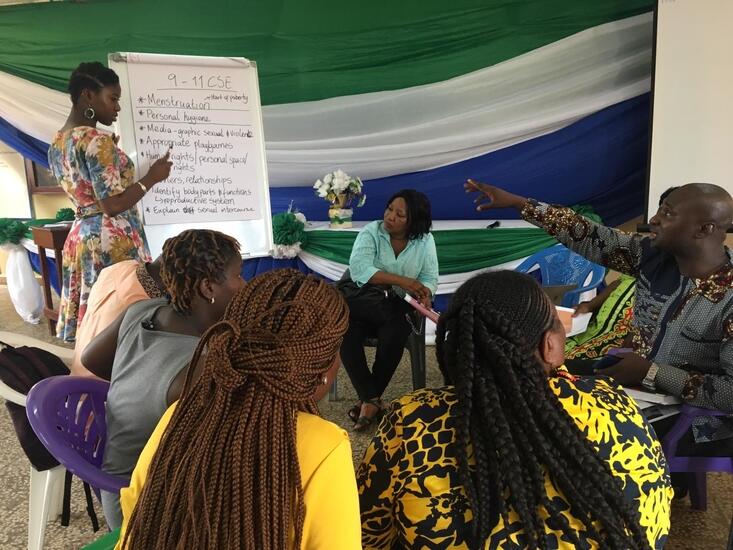Freetown, Sierra Leone, 26 June 2019 - “I had no sex education growing up, and if I had, I would have made different choices. With education, children can make better decisions,” said Maybelle Gamanga, Assistant Director, Guidance and Counselling Unit at the Ministry of Basic and Senior Secondary Education (MBSSE) in Sierra Leone. “Comprehensive sexuality education can drastically reduce teenage pregnancy and early child marriage,” added Ms. Gamanga who made her statement at the end of a UNFPA-supported workshop on integrating comprehensive sexuality education (CSE) in basic and senior secondary school curricula in Sierra Leone organised by the MBSSE, with funding from Irish Aid.
Comprehensive sexuality education is a curriculum-based process of teaching and learning about the cognitive, emotional, physical and social aspects of sexuality. It aims to equip children and young people with knowledge, skills, attitudes and values that will empower them to realise their health, well-being and dignity; develop respectful social and sexual relationships; consider how their choices affect their own well-being and that of others; and understand and ensure the protection of their rights throughout their lives
In Sierra Leone, the enrolment rate at senior secondary school is 58.3 percent for girls compared to 78 percent for boys. Findings from the UNICEF 2016 Out of School Children Study indicated that nearly three out of every ten (29 percent) out-of-school girls are excluded from school as a result of teenage pregnancy. According to the 2013 Sierra Leone Demographic and Health Survey approximately 28 per cent of adolescents aged 15-19 years old have begun childbearing. Maternal mortality is the leading cause of death among females aged 15-19 in Sierra Leone, accounting for 46.8 percent of deaths. With the high rate of pregnancy among adolescents in the country, it is a clear indication of limited knowledge, minimal use of, or access to, contraceptives and other sexual and reproductive health and rights services.
Every young person will one day have to make life-changing decisions about their sexual and reproductive health. Yet research shows that the majority of adolescents lack the knowledge required to make those decisions responsibly, leaving them vulnerable to coercion, sexually transmitted infections and unintended pregnancy.
The aim of the workshop, which ran from 24-28 June, was to review comprehensive sexuality education in the MBSSE curricula in order to ensure that adolescents have access to information, and develop critical thinking skills in relation to sexuality reproductive health and rights, as a core component of their formal education.
UNFPA works with the MBSSE to strengthen the capacity of the ministry to implement comprehensive sexuality education, both in schools and through community-based training and outreach. This support is a core component of the UNFPA Adolescent and Youth and Gender programming through the Strengthening Multi-Sectoral Responses to Adolescent Pregnancy Project.
The workshop opened with a statement from Mr. Mohamed S. Sesay, Director of School Inspectorate, who thanked UNFPA and Irish Aid for their support and funding to the MBSSE for the establishment of CSE and for helping children, especially girls, reach their full potential. The workshop was attended by representatives from the MBSSE, Health and Sanitation and Social Welfare, Gender and Children’s Affairs, in addition to representatives from the Teaching Service Commission, teacher training institutions, UN agencies, Irish Aid and non-governmental organisations.
Commenting on how useful the workshop had been, Alphonso Manley from the Sierra Leone Civil Rights Coalition, said, “It is clear that we need to further educate the public and religious leaders, that CSE is not about encouraging children to have sex, it’s about children understanding what sex is, and through understanding, delaying their first sexual experiences.”
Josephine J. Saidu, a public health nurse currently working with the School and Adolescent Health Programme at the Ministry of Health and Sanitation pointed out that the Ministry was working with colleagues in education to integrate CSE into the curriculum as part of the National Strategy for the Reduction of Adolescent Pregnancy and Child Marriage in Sierra Leone. He said, “It would ensure that adolescents have access to information and develop critical thinking skills in relation to sexuality and reproductive health and rights. With education you can make better choices, you can reduce teenage pregnancy, early marriage and unsafe abortions.”
For more information, please contact:
Ms Angelique Reid, Communication Specialist
UNFPA Sierra Leone
M: +232 78 340044


